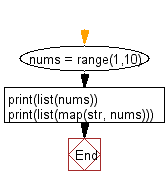Python: Generate and prints a list of numbers from 1 to 10
Generate List 1 to 10
Write a Python program to generate and print a list of numbers from 1 to 10.
Expected output:
[1, 2, 3, 4, 5, 6, 7, 8, 9]
['1', '2', '3', '4', '5', '6', '7', '8', '9']
Sample Solution:
Python Code:
# Create a range of numbers from 1 to 10 (exclusive).
nums = range(1, 10)
# Print the original list of numbers using the 'list' function.
print(list(nums))
# Convert each number in the list to a string using the 'map' function.
# Print the resulting list of strings.
print(list(map(str, nums)))
Sample Output:
[1, 2, 3, 4, 5, 6, 7, 8, 9] ['1', '2', '3', '4', '5', '6', '7', '8', '9']
Explanation:
Here is a breakdown of the above Python code:
- Range creation:
- The code creates a range of numbers using the "range()" function. The range includes integers from 1 to 9 (10 is exclusive).
- Printing original list:
- The original list of numbers is printed using the "list" function to convert the range to a list.
- Mapping to strings:
- The map function is used to apply the "str" function to each element in the nums range.
- This converts each integer in the range to its string representation.
- Printing resulting list:
- The resulting list of strings is printed using the "list" function to convert the mapped values to a list.
Flowchart:

For more Practice: Solve these Related Problems:
- Write a Python program to generate a list of numbers from 1 to 9 using the range() function.
- Write a Python program to create a list of integers from 1 to 10 and then convert each integer to a string.
- Write a Python program to output a list of numbers in the range 1 to 10 using list comprehension.
- Write a Python program to generate a list of numbers starting at 1 and ending at 9 using a for loop.
Go to:
Previous: Write a Python program to print letters from the English alphabet from a-z and A-Z.
Next: Write a Python program to identify nonprime numbers between 1 to 100 (integers). Print the nonprime numbers.
Python Code Editor:
Have another way to solve this solution? Contribute your code (and comments) through Disqus.
What is the difficulty level of this exercise?
Test your Programming skills with w3resource's quiz.
